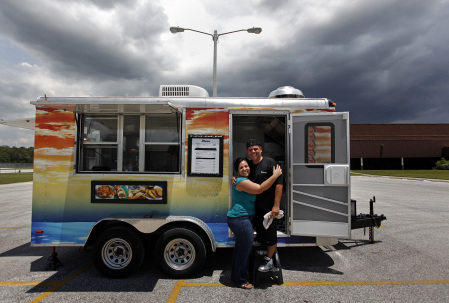TAMPA BAY, FL – One restaurant succeeds and another fails. The critical difference? Often it’s location. But what if location weren’t an issue, if like a potted plant relocated to receive the maximum life-sustaining rays of sunlight, a restaurant could just move around to where the customers were? Thus went the thinking that has led to the great food truck invasion of the past couple of years.
A trend that most people track back to Roy Choi’s Kogi Korean BBQ in 2008 in Los Angeles, the food truck craze departs from the 1980s office roach coach or even the Texas rancher’s chuck wagon in one key respect: It is buoyed by new social media like Twitter and Facebook. Customers are not just finding these food trucks serendipitously — they are being cyberstalked and hunted down like bison on the Great Plains.
In many American cities, the trend is also a reflection of the economy: Dazzlingly trained chefs are without a gig. Not having the financial wherewithal to scrape together the $1 million or so needed to start their own brick-and-mortar restaurants, they’ve taken to the streets, rehabbing Airstreams and school buses and rickshaws to get their culinary visions to the masses.
The Tampa Bay area has been slightly late to the game. Taco Bus and DaKine Hawaiian Café were early entries, but just recently a convoy of new food trucks have started revving their engines in the area and a new Support Tampa Bay Food Trucks page has gone up on Facebook.
There may be good reasons for our tardiness — the past week of food truck chasing left me frizzy-haired and panting, feeling deep sympathy for those jockeying behind the sizzling griddles. Our weather is a hard sell in the summer, thunderstorms and mosquito swarms adding another layer of complexity.
Food trucks have taken off in cities where there are dense pedestrian centers — something the Tampa Bay area lacks. But the biggest impediment may be local ordinances that make it unlawful to stop, stand or park on streets or in city-owned or -operated parking lots and garages or on other city property in order to sell something. Thus, our food trucks must park on private property.
Find the entire article <here>




